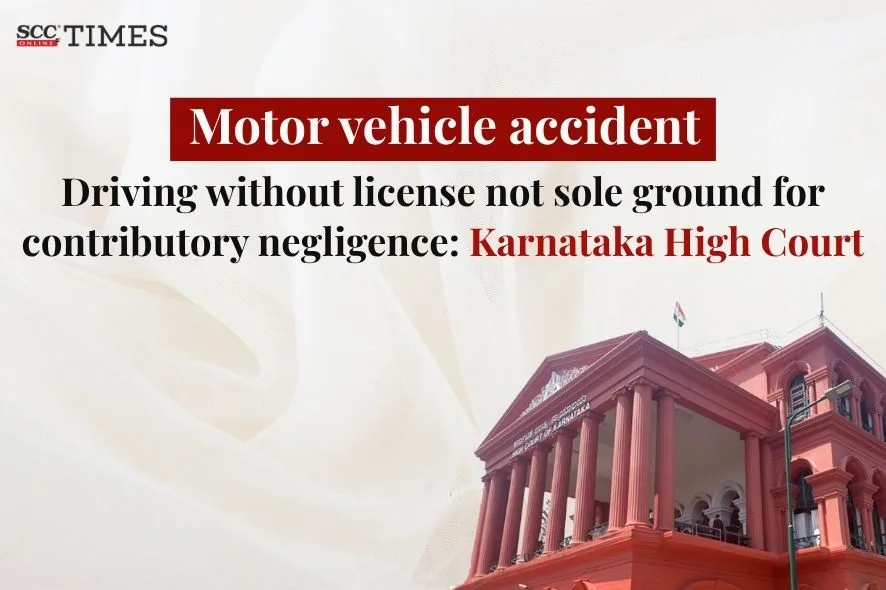Karnataka High Court: In a miscellaneous first appeal filed by the appellant against the order of Motor Accident Claims Tribunal (‘Tribunal’) holding the appellant responsible for contributory negligence in a motor vehicle accident case, a Single-Judge Bench of Chillakur Sumalatha, J., held that not holding a license to ride the vehicle which is involved in the accident does not in itself amount to contributory negligence unless it is proved that the lack of a license contributed to the accident. The Court also awarded compensation under the head of loss of future earnings which the Tribunal failed to award.
Background
On 04-01-2015 while the appellant was driving his motorcycle along with his relative and took U-turn to proceed towards Hirehalli Village, the rider of motorcycle driving his vehicle in a rash and negligent manner endangering human life and at a high speed, came on the extreme right side of the road and dashed against his motorcycle, due to which the appellant fell down and sustained injuries. The appellant filed a case under the Motor Vehicles Act, 1988 (‘MV Act’) wherein the Motor Accident Claims Tribunal (‘Tribunal’) partly allowed the claim petition but attributed 25% contributory negligence to the appellant. Aggrieved by the finding on contributory negligence and the amount of compensation awarded, the appellant filed the present appeal.
Analysis and Decision
The Court noted that in Sudhir Kumar Rana v. Surinder Singh, (2008) 12 SCC 436, the Supreme Court has held that driving a vehicle without a license, while an offence, does not by itself lead to a finding of negligence as regards the accident, unless it is proven that the lack of a license contributed to the accident. The Court observed that,
“Only because the appellant was not holding driving license to ride his vehicle which is involved in the accident it cannot be held that he contributed to the accident to occur when all other convincing evidence speaks that the rider of the other vehicle which is involved in the accident was solely at fault.”
The Court observed that the Tribunal erred in attributing contributory negligence on the part of the appellant.
On the issue of the quantum of compensation the Tribunal had denied compensation for loss of future earnings, citing a lack of documents for follow-up treatment by the appellant and no mention of amputation of his limb as claimed by him. However, the Court found no evidence on record to suggest that the appellant failed to take follow-up treatment or acted against medical advice, or that there was negligence on the part of the treating doctor or the appellant. The Court observed that the amputation of left leg of appellant above knee was undoubtedly due to the injuries sustained during accident. The Court was of the view that the Tribunal ought to have awarded the entitled amount under the head loss of future earnings.
In light of the afore-stated reasons, the Court set aside the contributory negligence attributed to the appellant. The Court further held that the appellant was entitled to compensation for loss of future earnings, enhancing the Tribunal’s award by Rs. 5,67,000 with 6% interest from the date of filing of the petition.
[Shivegowda v. Nanjeshgowda, 2025 SCC OnLine Kar 14720, decided on 16-07-2025]
Advocates who appeared in this case:
For the Appellant: Sampath Kumar for Pratheep K. C., Advocate
For the Respondent: O. Mahesh, Advocate



I like this site.